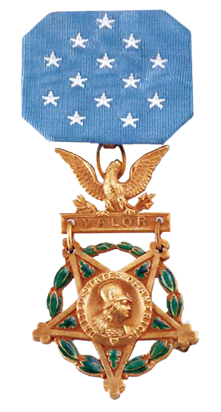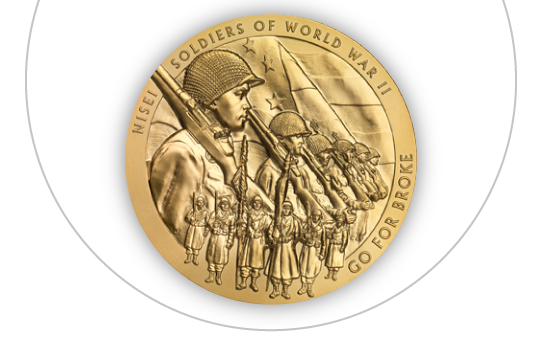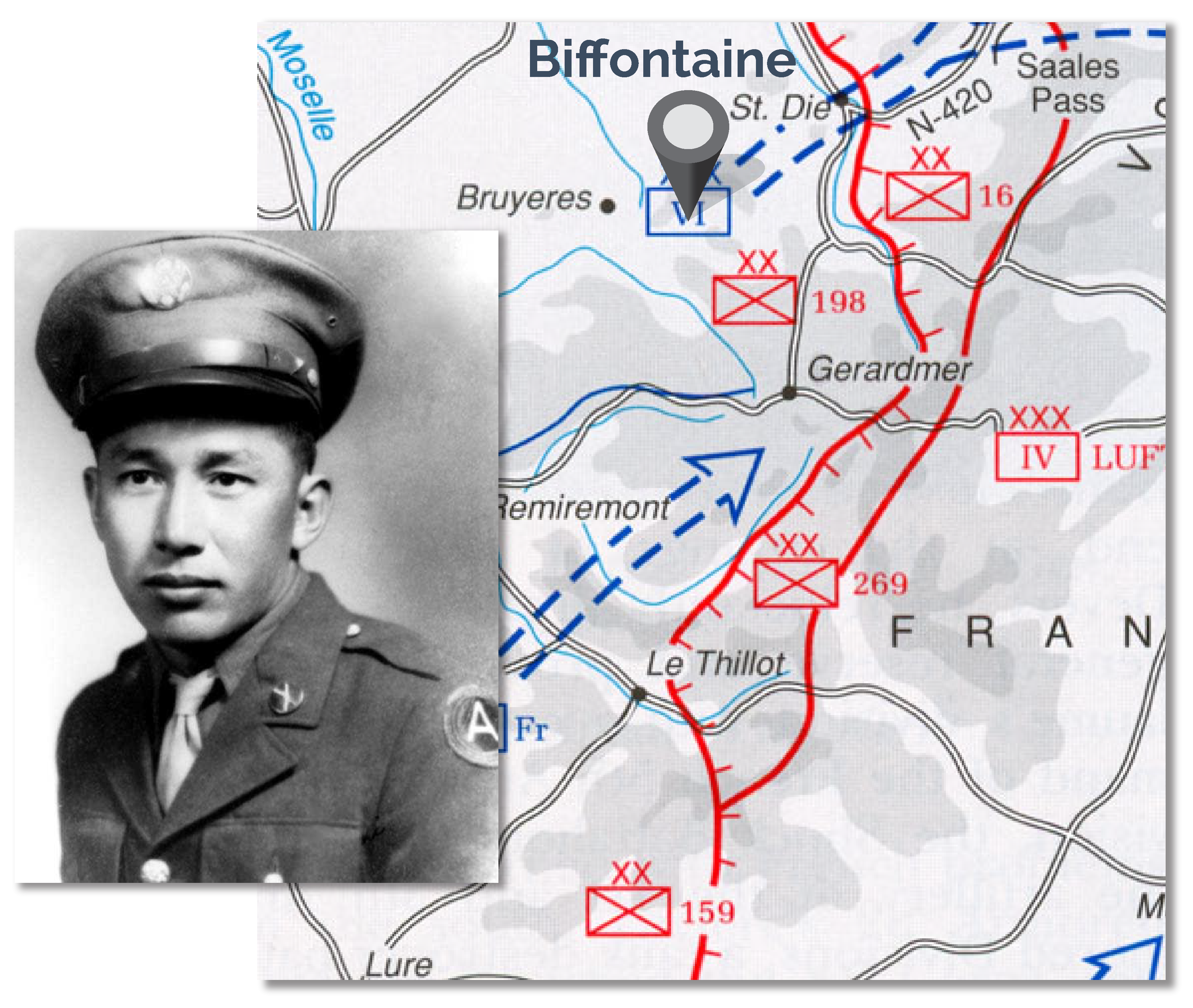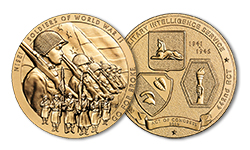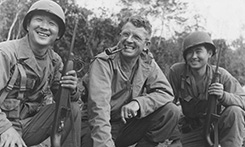The Medal of Honor
The Medal of Honor was awarded to 21 Japanese American soldiers of the 100th Infantry Battalion and the 442nd Regimental Combat Team.
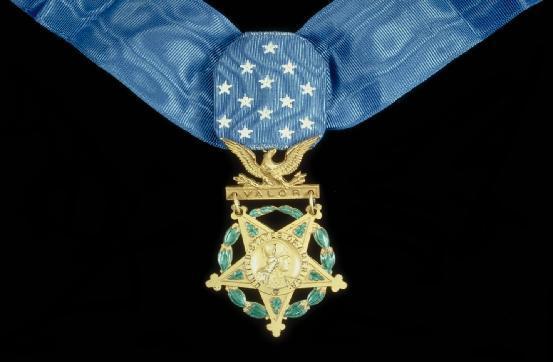
Courage. Gallantry. Bravery. Sacrifice.
The Medal of Honor is America’s highest military honor and is awarded to an individual who distinguishes himself with acts of valor at the risk of his life above and beyond the call of duty. The deed performed must be one of personal bravery or self-sacrifice so conspicuous as to clearly distinguish the individual above his comrades.
Unlike the Congressional Gold Medal, the highest civilian honor bestowed by Congress, the Medal of Honor is a military honor reserved only for the most gallant and intrepid individuals.

Map of World War II American Concentration Camps
The 100th Infantry Battalion and 442nd Regimental Combat Team were the most decorated military unit in all of US Army history for their size and length of service. The Japanese American soldiers of this unit, and other units, were recognized for fighting with incredible bravery. Their motivations were many. Loyalty, camaraderie, and a deep commitment to service to their country were chief among them.
In many cases these courageous young men fought while their families remained behind barbed wire back in home in America. To do so under such challenging circumstances only underscores their personal commitment. Yet at the end of World War II, despite their heroic efforts, only one Japanese American, Sadao Munemori, was acknowledged for his individual sacrifice to his country with the Medal of Honor award.
Map of World War II American Concentration Camps
More than fifty years later, at the mandate of Congress, the US Army reviewed the records of more than 50 Asian American recipients of the Distinguished Service Cross. They deemed that 20 Japanese Americans would have these awards upgraded to the Medal of Honor. All were from the 100th Infantry Battalion and the 442nd Regimental Combat Team and fought in Italy and Southern France.
On June 21, 2000, on the South Lawn of the White House, President Bill Clinton presented the medals, honoring the seven veterans who were still living and 13 of them posthumously.
“It is long past time,” President Clinton declared, “to break the silence about their courage, to put faces and names with the courage, and to honor it by name.”
Asian Pacific American Medal of Honor recipients and relatives, June 21, 2000
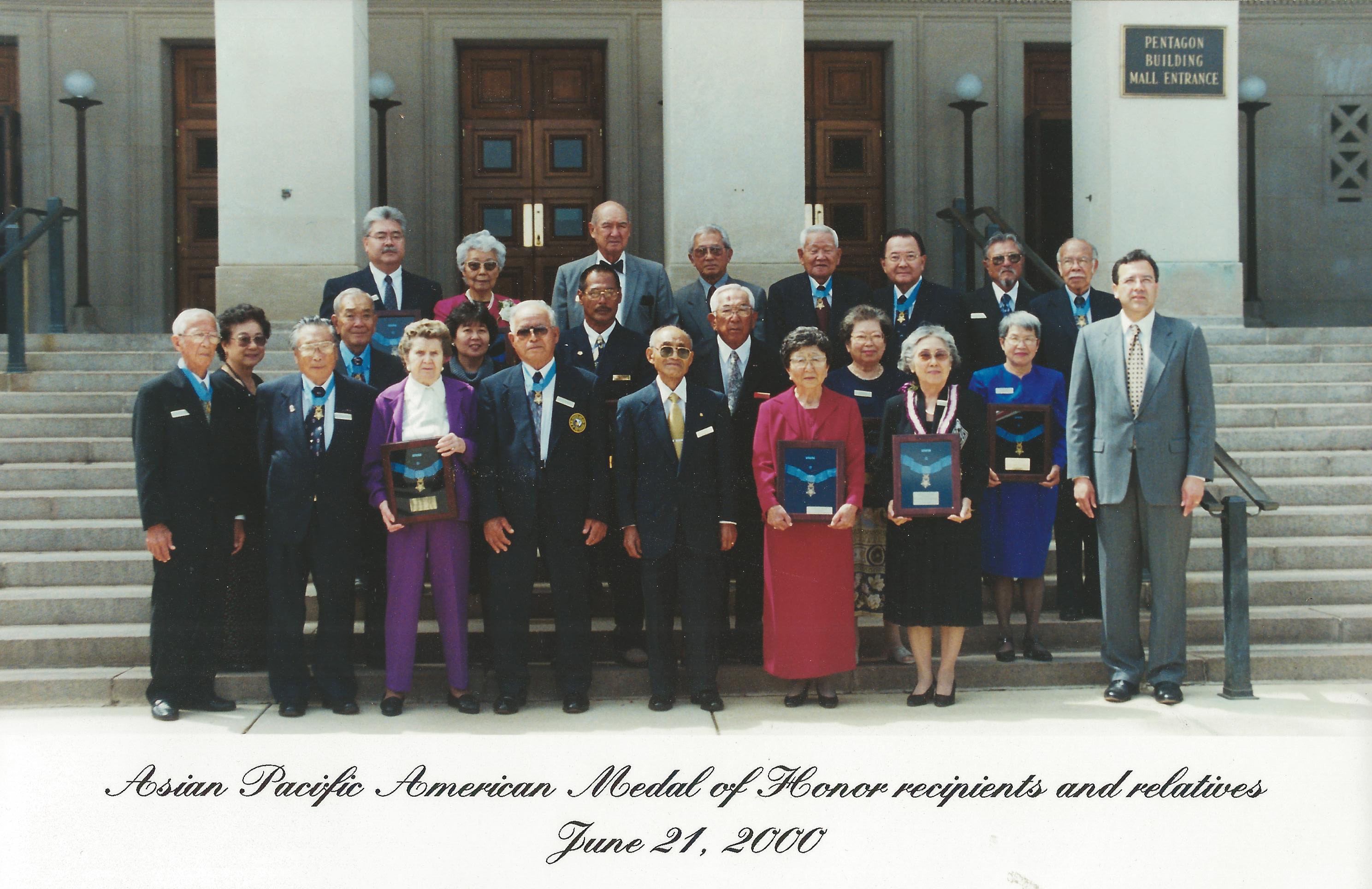
Asian Pacific American Medal of Honor recipients and relatives, June 21, 2000
Rarely has a nation been so well served by a people it has so ill-treated. ... They risked their lives, above and beyond the call of duty. And in so doing, they did more than defend America; in the face of painful prejudice, they helped to define America at its best.
The acts of valor performed by these 21 Japanese American Medal of Honor recipients were so courageous that they could seem incomprehensible to many Americans.
These brave men often single-handedly rescued the wounded and were wounded themselves, led attacks that inspired others, overcame superior numbers, risked and, in several cases, gave their lives for their country.
The following excerpts from their citations highlight these acts and provide a sense, however limited, of their heroic deeds.
The citations excerpted here are taken from the US Army Center of Military History.
Private Mikio Hasemoto
Company B, 100th Infantry
Battalion (Separate)
Killed in action in Cerasuolo, Italy,
November 29, 1943
Born: Honolulu, Hawaii, July 13, 1916
Died:
November 29, 1943
Hasemoto and his squad leader killed approximately 20 enemy soldiers. ... Killed 10 more enemy soldiers. ... Continued to repel enemy attacks until he was killed by enemy fire.
Pvt. Mikio Hasemoto
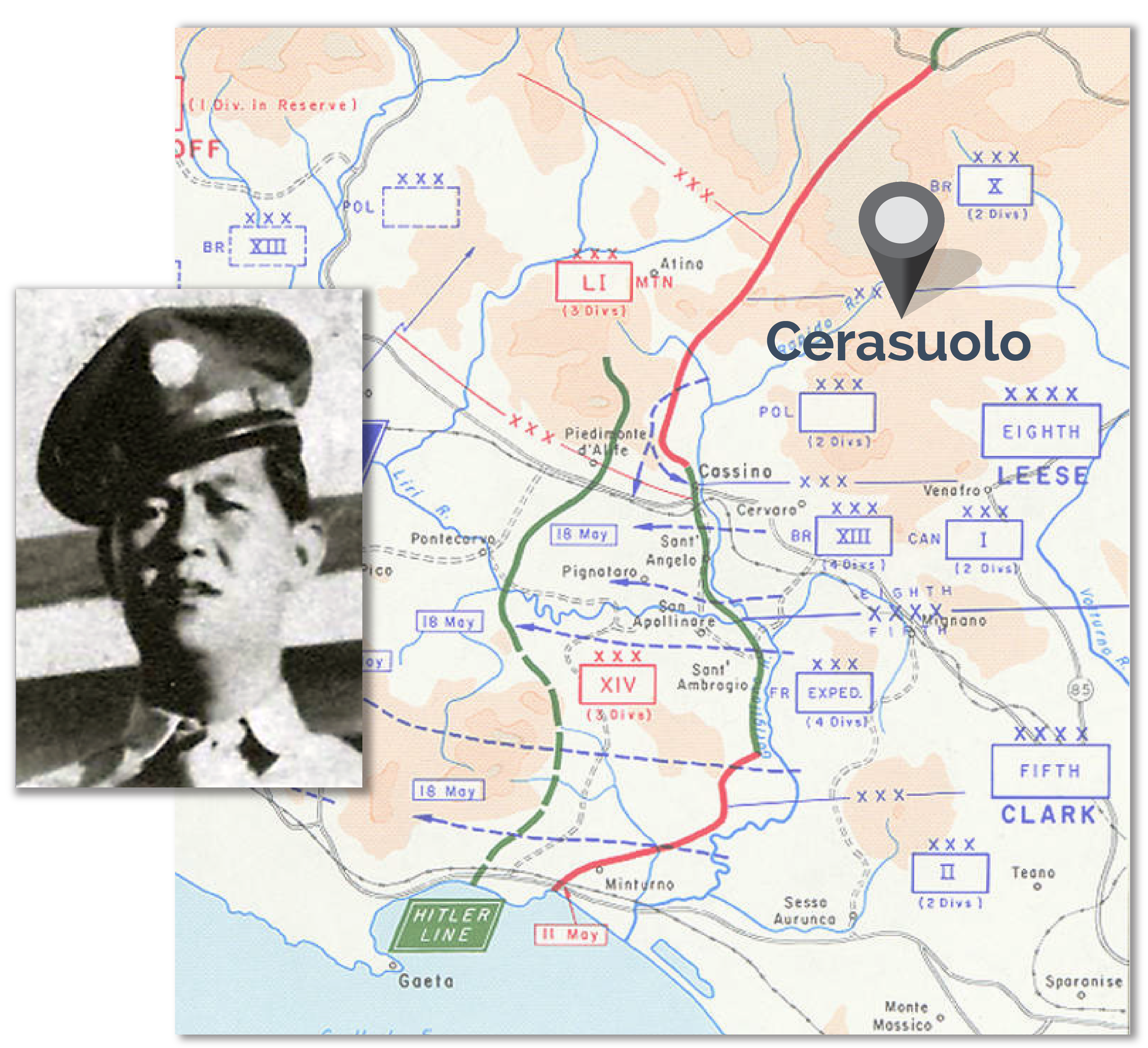
Pvt. Mikio Hasemoto
Private Joe Hayashi
Company K, 442nd Regimental Combat
Team
Killed in action near Tendola, Italy between April 20 and
22, 1945
Born: Salinas, California, August 14, 1920
Died: April
22, 1945
Family incarcerated
at Heart Mountain
After dragging his wounded comrades to safety, he returned alone. ... Boldly attacking the hill ... killed 27 men, and wounded many others. ... Forcing surrender and others to flee. ... Mortally wounded by a burst of machine pistol fire.
Pvt. Joe Hayashi
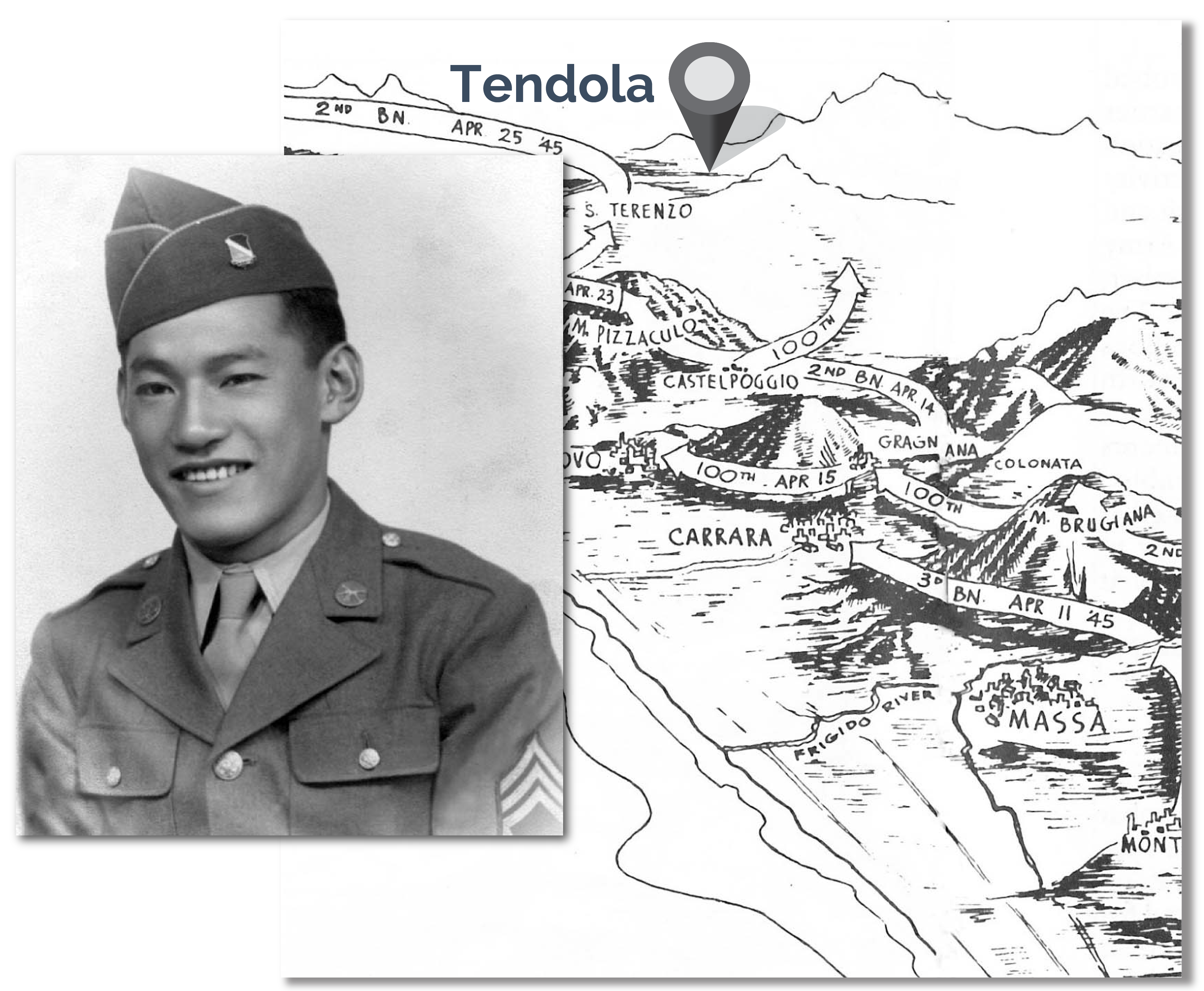
Pvt. Joe Hayashi
Private Shizuya Hayashi
Company A, 100th Infantry
Battalion (Separate)
For actions at Cerasulolo, Italy, November
29, 1943
Born: Waialua, Oahu, Hawaii, November 28, 1917
Died:
March 12, 2008
Rose alone in the face of fire, overtook an enemy machine gun position, killing seven men and two more as they fled. Hayashi returned fire killing nine of the enemy, taking four prisoners, and forcing the remainder to withdraw.
Pvt. Shizuya Hayashi
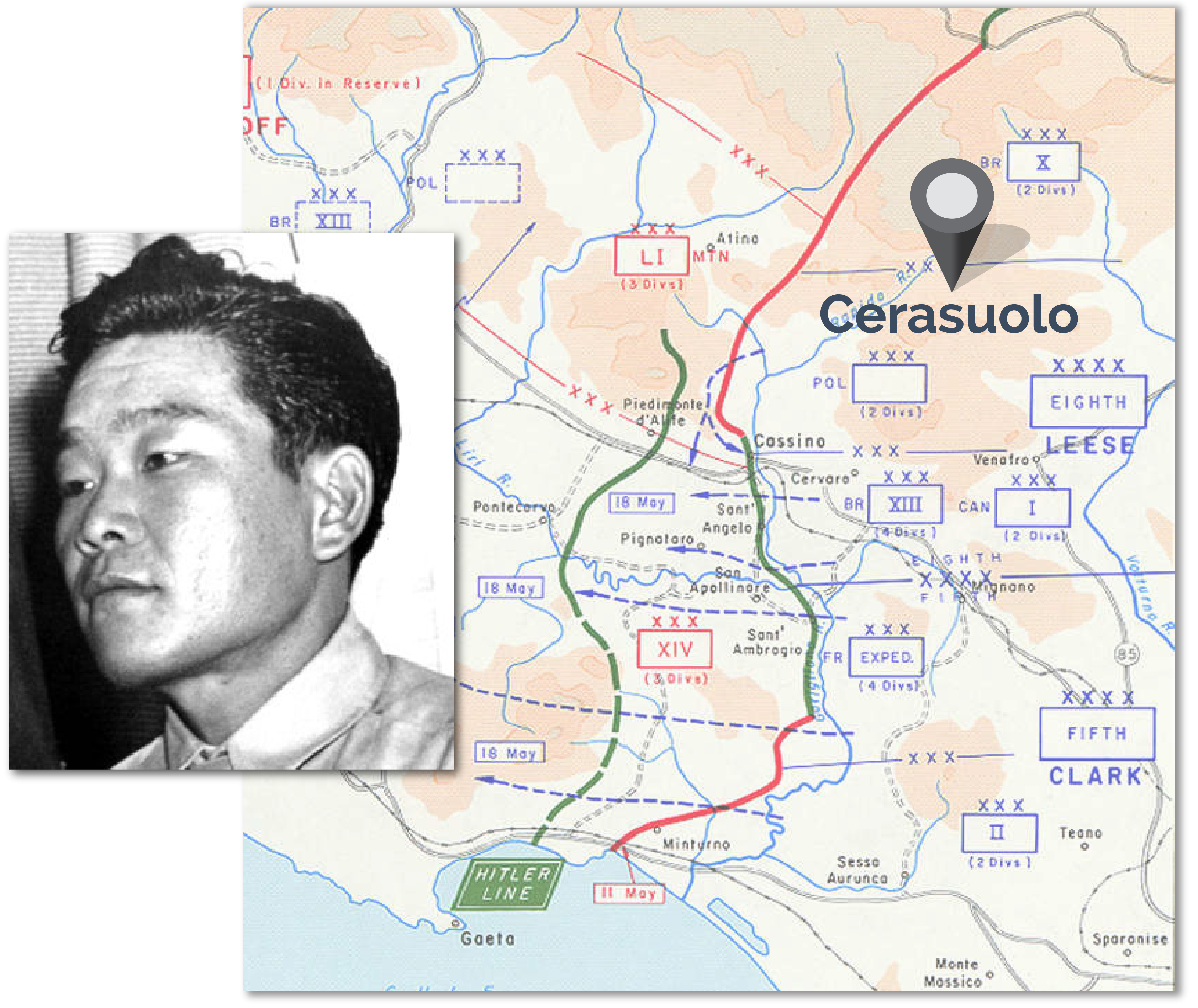
Pvt. Shizuya Hayashi
Second Lieutenant Daniel K. Inouye
Company E, 442nd Regimental Combat
Team
For actions near Mt. Nebbione, Italy, April 1945
Born: Honolulu, Hawaii, September 7, 1924
Died: December 17, 2012
With complete disregard for his personal safety, crawled up the treacherous slope. Although wounded, continued to engage at close range until an exploding grenade shattered his right arm. Despite the intense pain, he continued to direct his platoon until enemy resistance was broken.
2nd Lt. Daniel K. Inouye
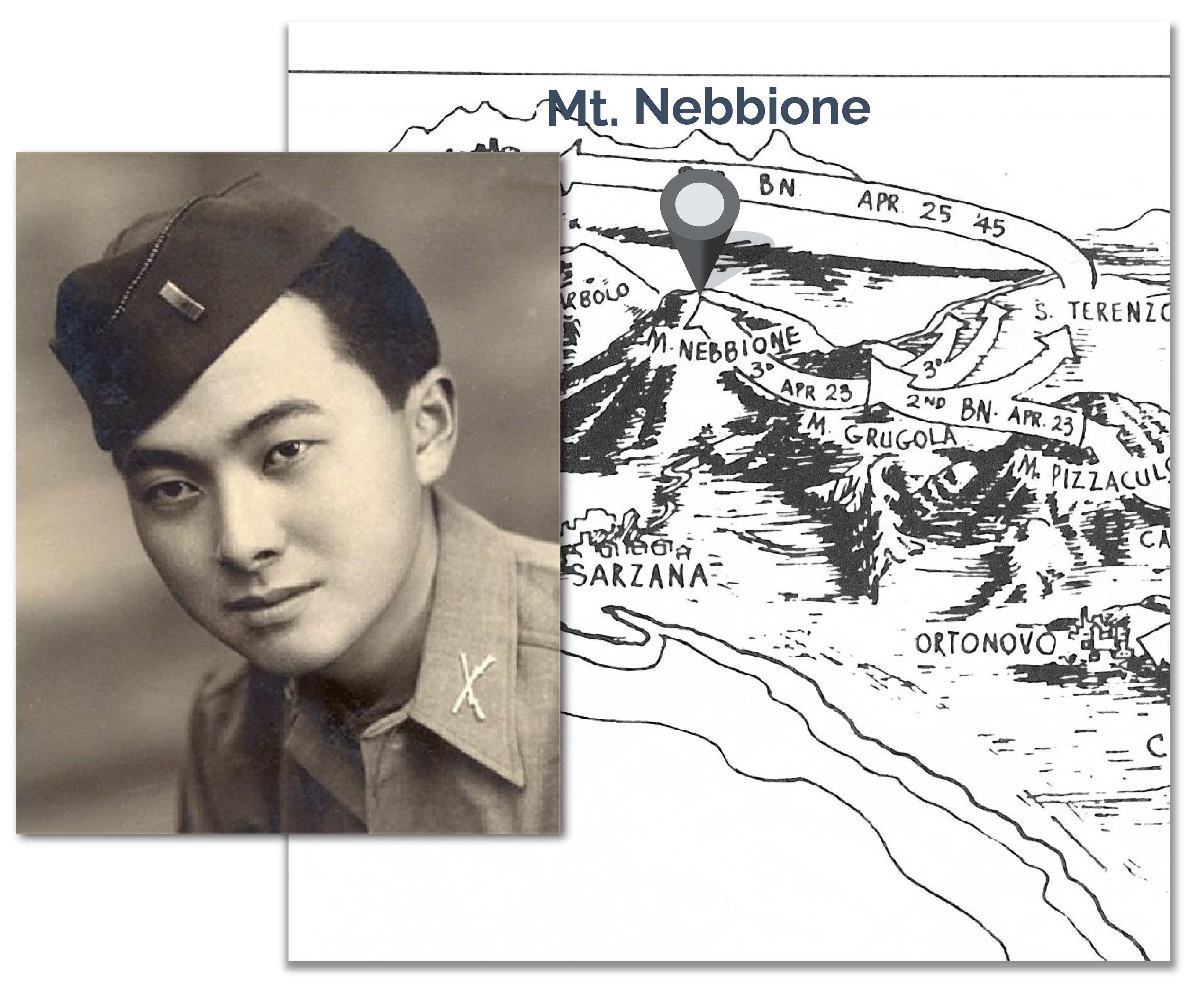
2nd Lt. Daniel K. Inouye
Technical Sergeant Yeiki Kobashigawa
Company B, 100th Battalion
(Separate)
For actions near Lanuvio, Italy, June 2, 1944
Born:
Hilo, Hawaii, September 28, 1917
Died: March 31, 2005
Crawled forward with one of his men, threw a grenade and then charged the enemy with his submachine gun. ... Provided close supporting fire while a fellow soldier captured four prisoners. ... Discovered four more. ... Led a squad in neutralizing two of them.
Tech. Sgt. Yeiki Kobashigawa
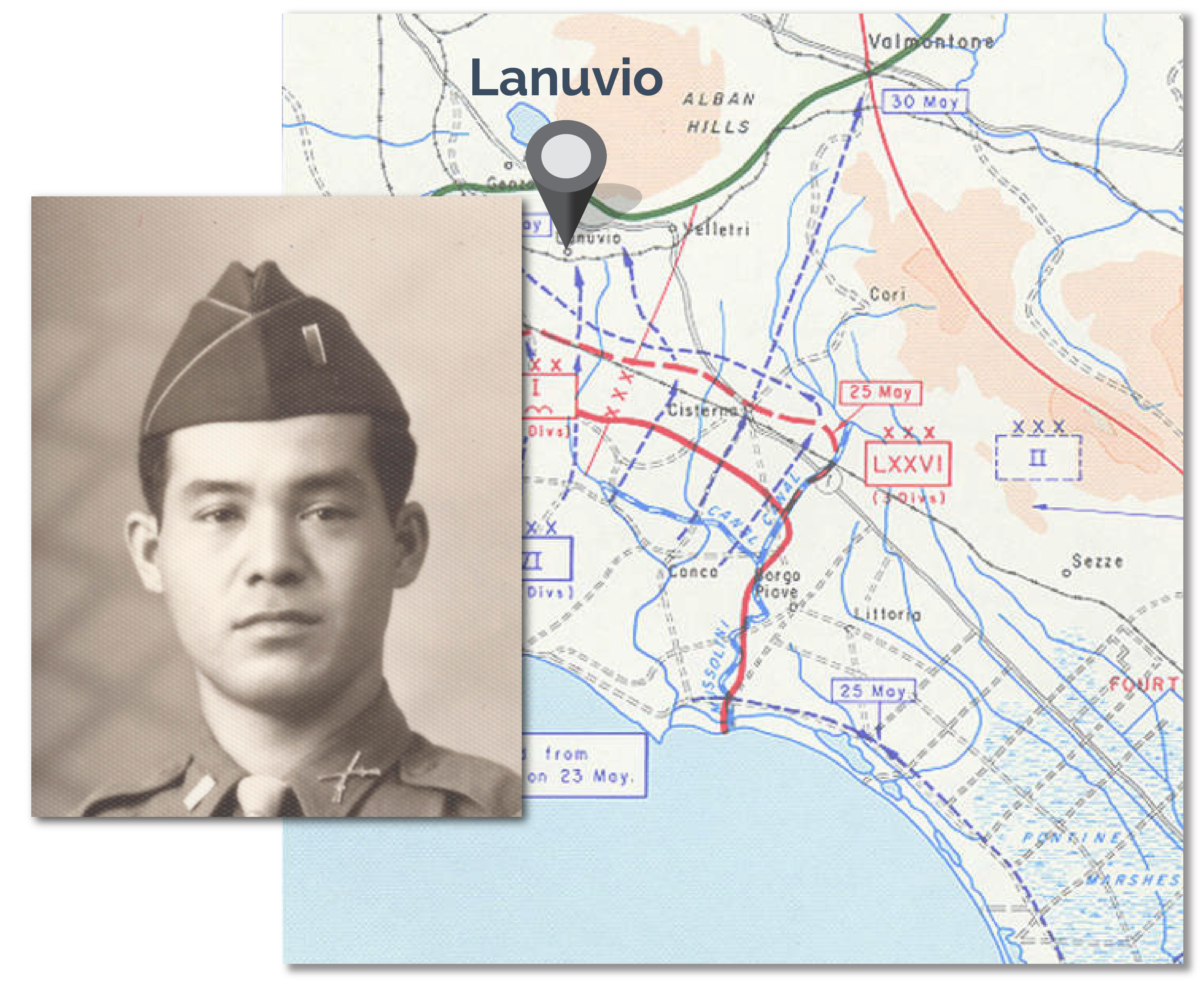
Tech. Sgt. Yeiki Kobashigawa
Staff Sergeant Robert T. Kuroda
Company H, 442nd Regimental Combat
Team
Killed in action at Bruyères, France, October 20,
1944
Born: Aiea, O'ahu, Hawaii, November 8, 1922
Died: October
20, 1944
Boldly made his way through heavy fire. ... Rushing to the officer's assistance, he found that the officer had been killed. Picking up the officer's submachine gun ... advanced through continuous fire. As he turned to fire, he was killed by a sniper.
Staff Sgt. Robert T. Kuroda
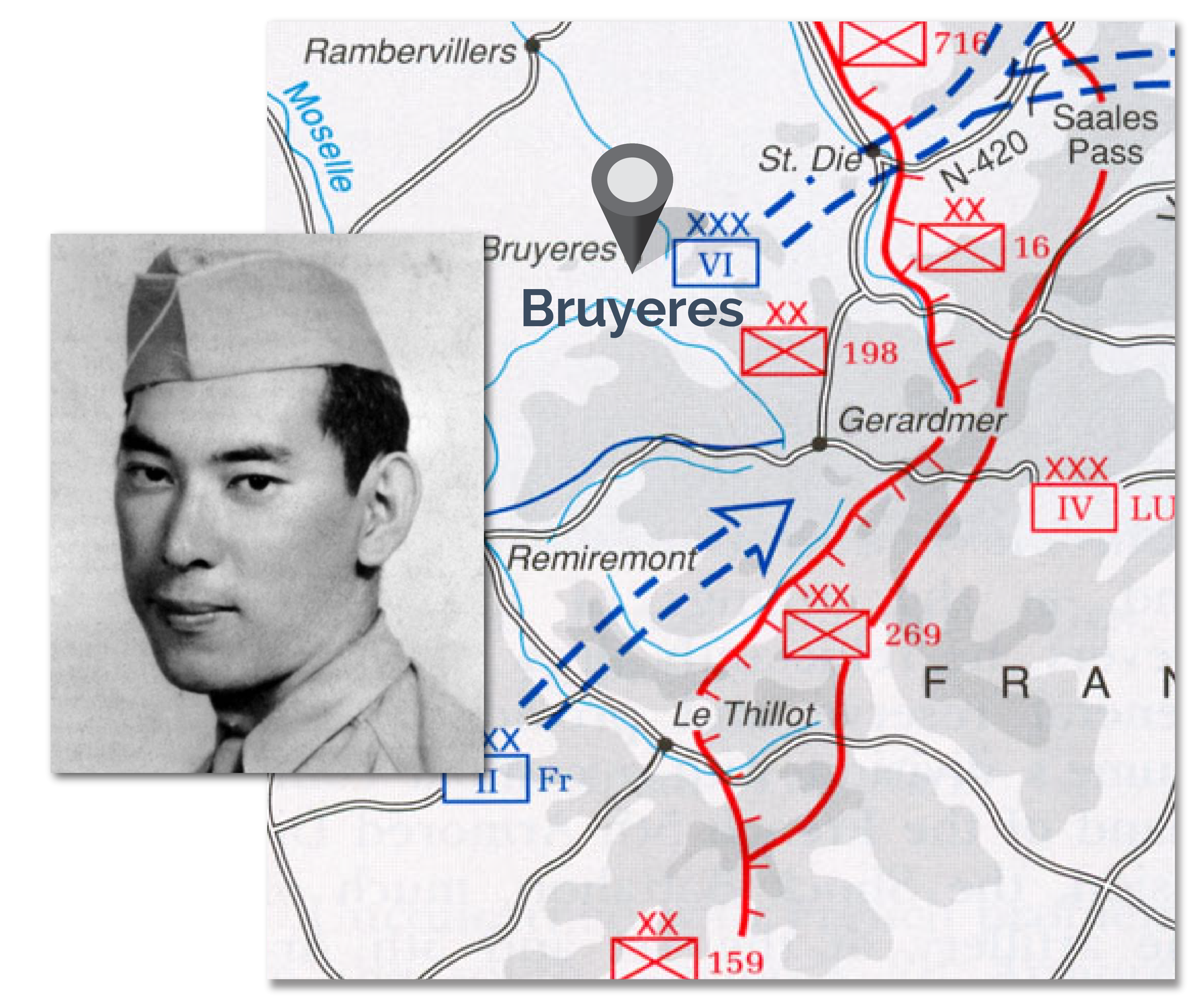
Staff Sgt. Robert T. Kuroda
Private First Class Kaoru Moto
Company C, 100th Battalion
(Separate)
For actions near Castellina, Italy, July 7, 1944
Born:
Spreckelsville, Maui, Hawaii, April 25, 1917
Died: August 26, 1992
Severely wounded. ... Relieved of his position, he made his way to the rear for treatment. Spotted an enemy machine gun nest. ... Opening fire, he wounded two of the three soldiers. ... Ordered the enemy soldier to surrender.
Pfc. Kaoru Moto
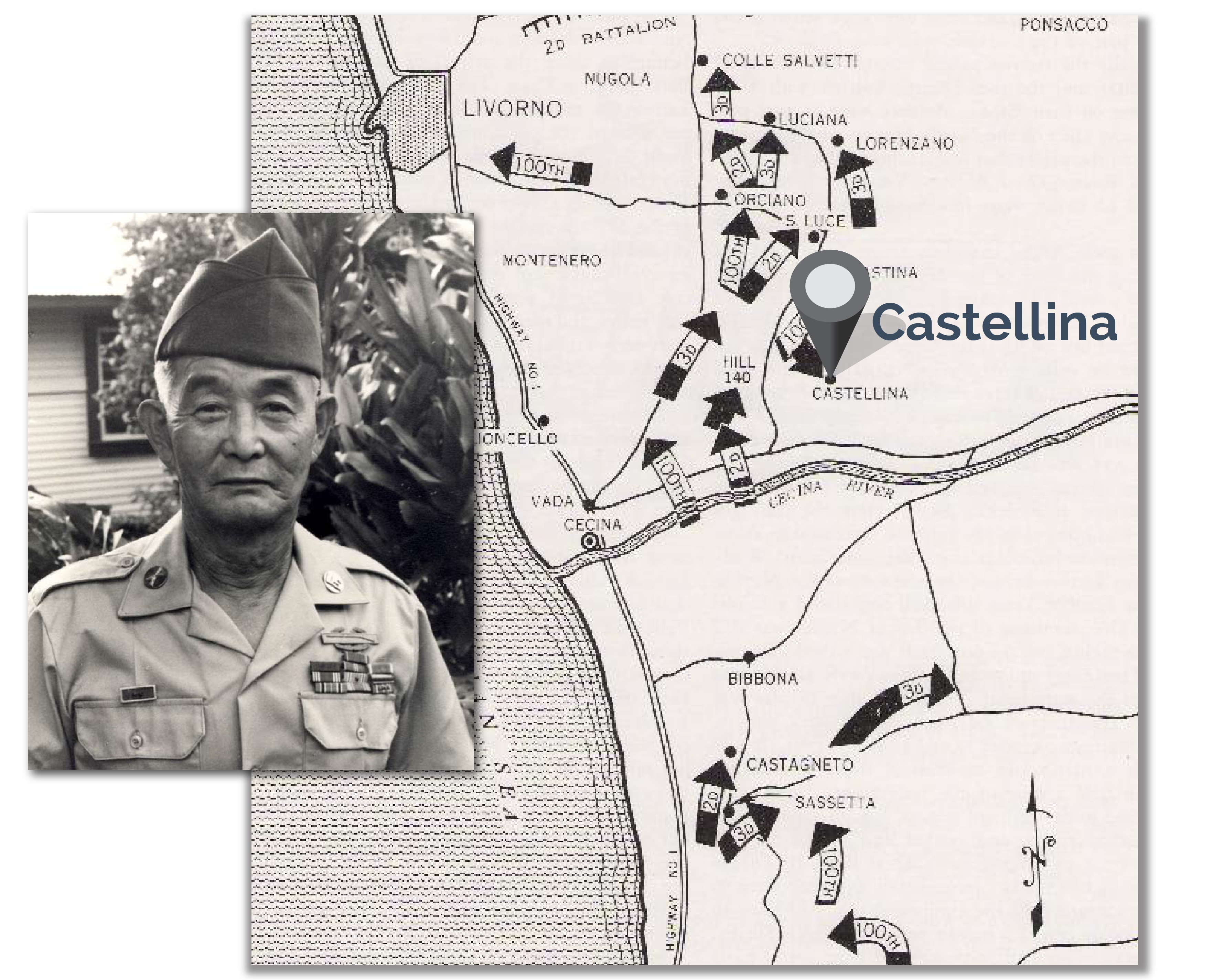
Pfc. Kaoru Moto
Private First Class Sadao S. Munemori
Company A, 100th Infantry
Battalion, 442nd
Regimental Combat Team
Killed in action near Seravezza, Italy,
April 5, 1945
Born: Los Angeles, California, August 17, 1922
Died:
April 5, 1945
Family incarcerated at Manzanar
Pinned down by grazing fire from the enemy. ... Made frontal one-man attacks through direct fire. An unexploded grenade bounced on his helmet and rolled toward his helpless comrades. He dived for the missile and smothered its blast.
Pfc. Sadao S. Munemori
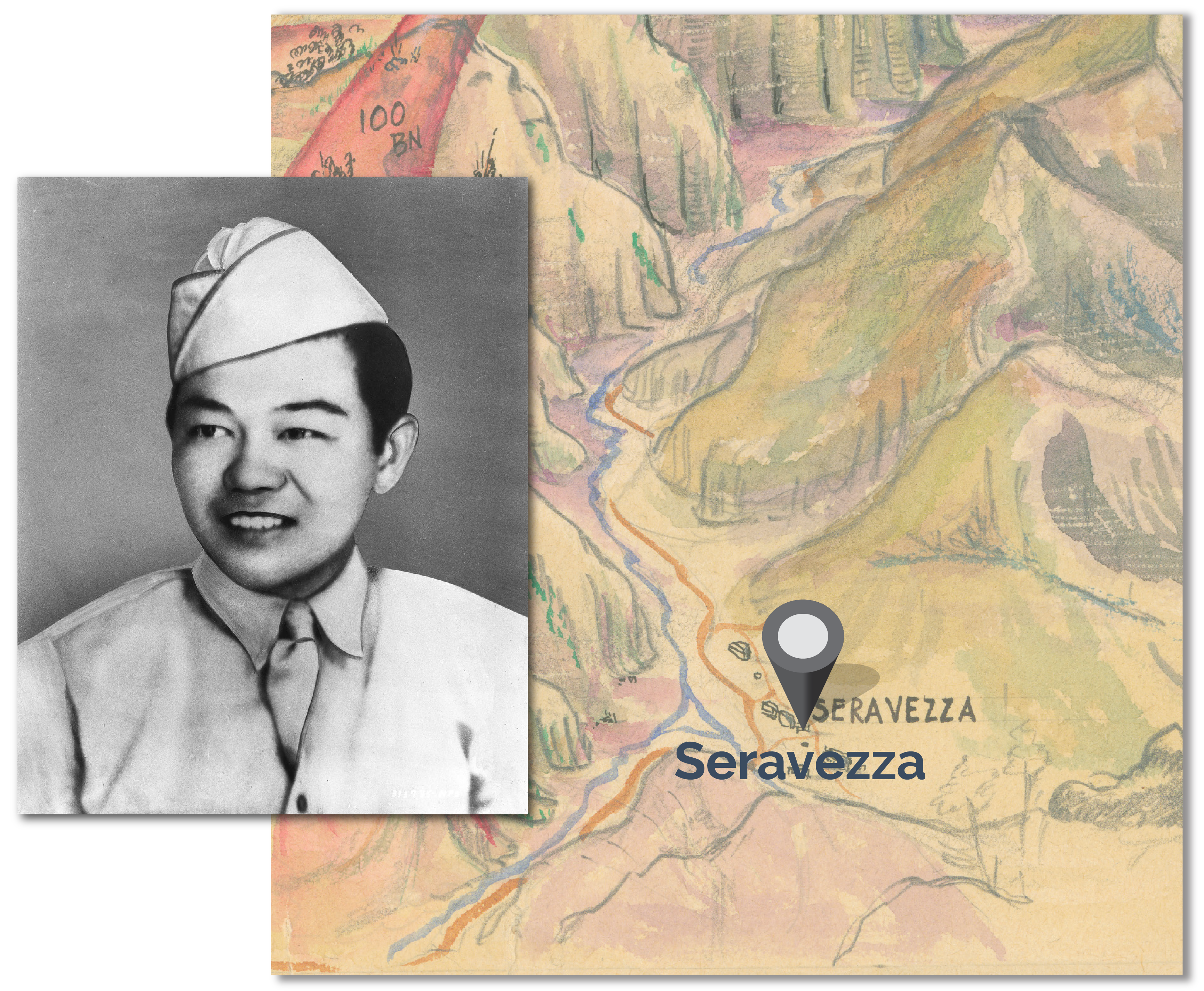
Pfc. Sadao S. Munemori
Private First Class Kiyoshi Muranaga
Company F, 442nd Regimental Combat
Team
Killed in action at Suvereto, Italy, June 26, 1944
Born: Los Angeles, California, February 16, 1922
Died: June 26,
1944
Enlisted while incarcerated at Amache
Muranaga attempted to neutralize the 88mm weapon alone. ... Manned the mortar himself and opened fire. ... 88mm shell scored a direct hit, killing him instantly. Because of Muranaga's previous fire, the enemy soldiers abandoned their position.
Pfc. Kiyoshi Muranaga
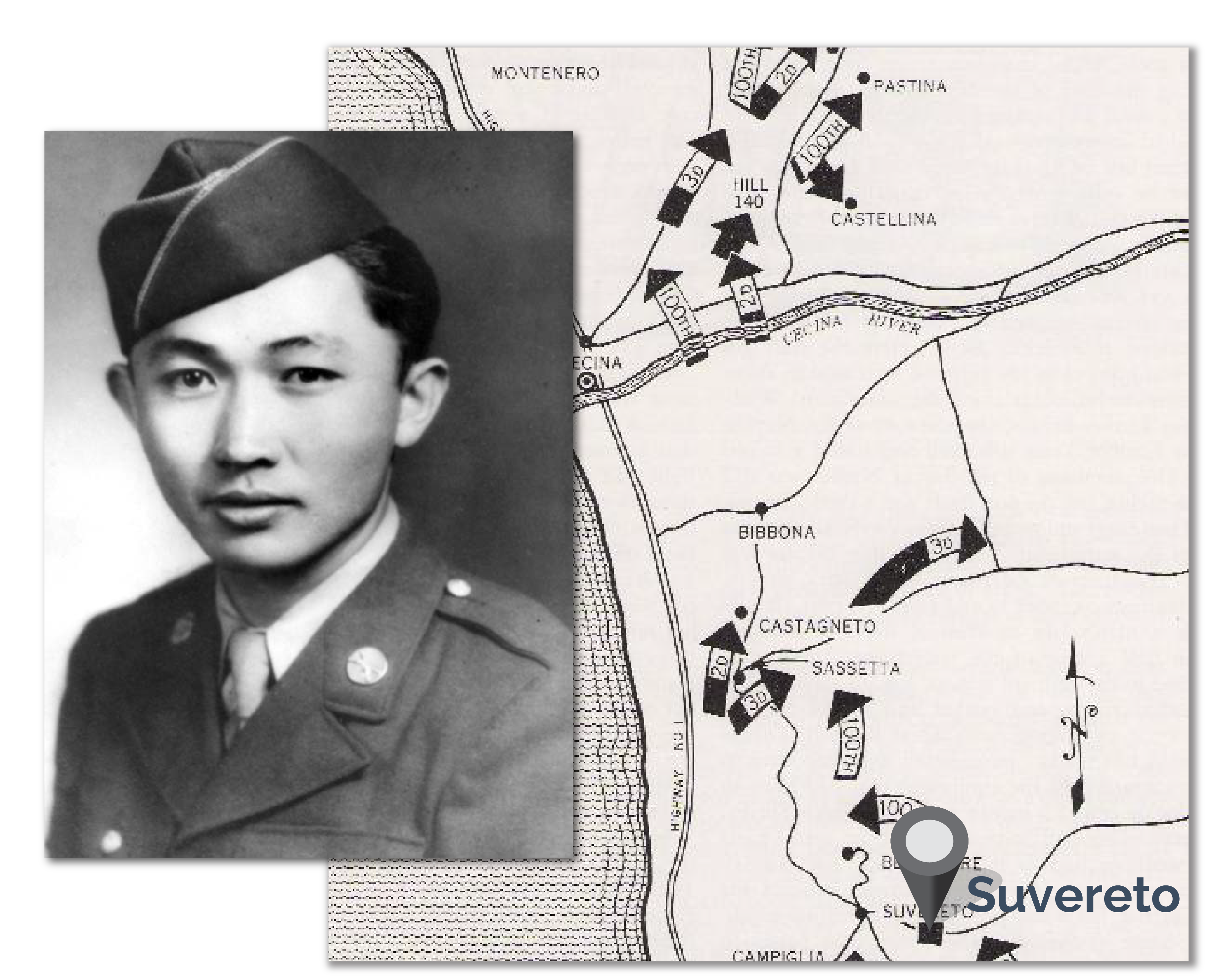
Pfc. Kiyoshi Muranaga
Private Masato "Curly" Nakae
Company A, 100th Infantry
Battalion, 442nd
Regimental Combat Team
For actions at Pisa, Italy, August 19,
1944
Born: Lihue, Kauai, Hawaii, December 20, 1917
Died:
September 4, 1998
Fired rifle grenades at the steadily advancing enemy ... and forced them to withdraw. ... Seriously wounded. ... Despite his injury, he continued firing, inflicting heavy casualties. ... Succeeded in breaking up the attack.
Pvt. Masato "Curly" Nakae

Pvt. Masato "Curly" Nakae
Private Shinyei Nakamine
Company B, 100th Infantry
Battalion (Separate)
Killed in action at La Torreto, Italy, June
2, 1944
Born: Wai'anae, Oahu, Hawaii, January 21, 1920
Died:
June 2, 1944
Pinned down by intense machine gun crossfire ... charged the machine gun nest. ... Killed three and captured two. ... Threw hand grenades, wounding one and capturing four. ... Led the team but was killed by a burst of machine gun fire.
Pvt. Shinyei Nakamine
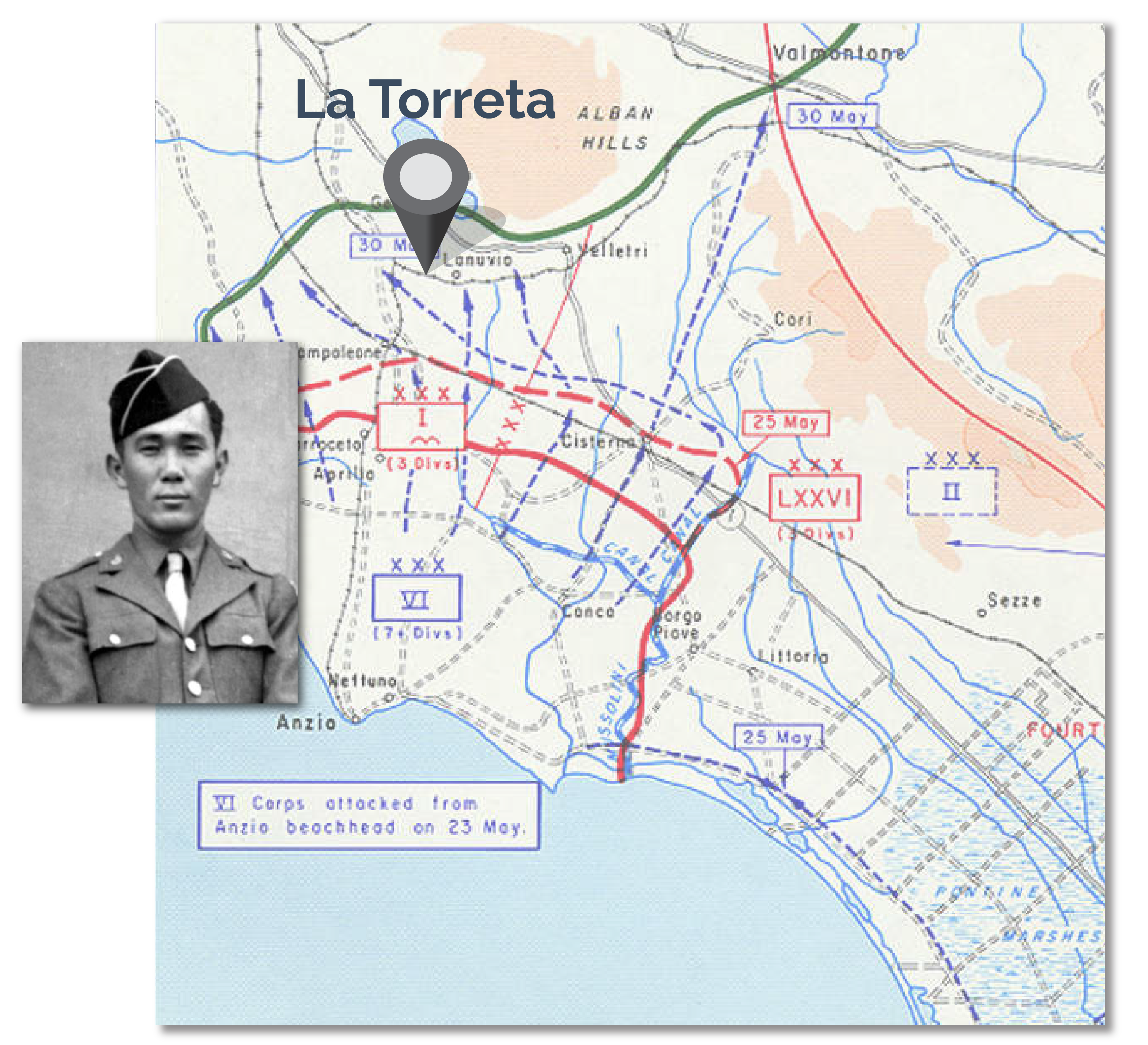
Pvt. Shinyei Nakamine
Private First Class William Nakamura
Company G, 442nd Regimental Combat
Team
Killed in action at Castellina, Italy, July 1944
Born: Seattle, Washington, January 21, 1922
Died: July 4, 1944
Enlisted
while incarcerated at
Minidoka
Remained in position to cover his comrades' withdrawal. ... Fired his weapon to pin down the enemy machine gunners. ... His platoon was then able to withdraw to safety without further casualties. ... Was killed during this heroic stand.
Pfc. William Nakamura
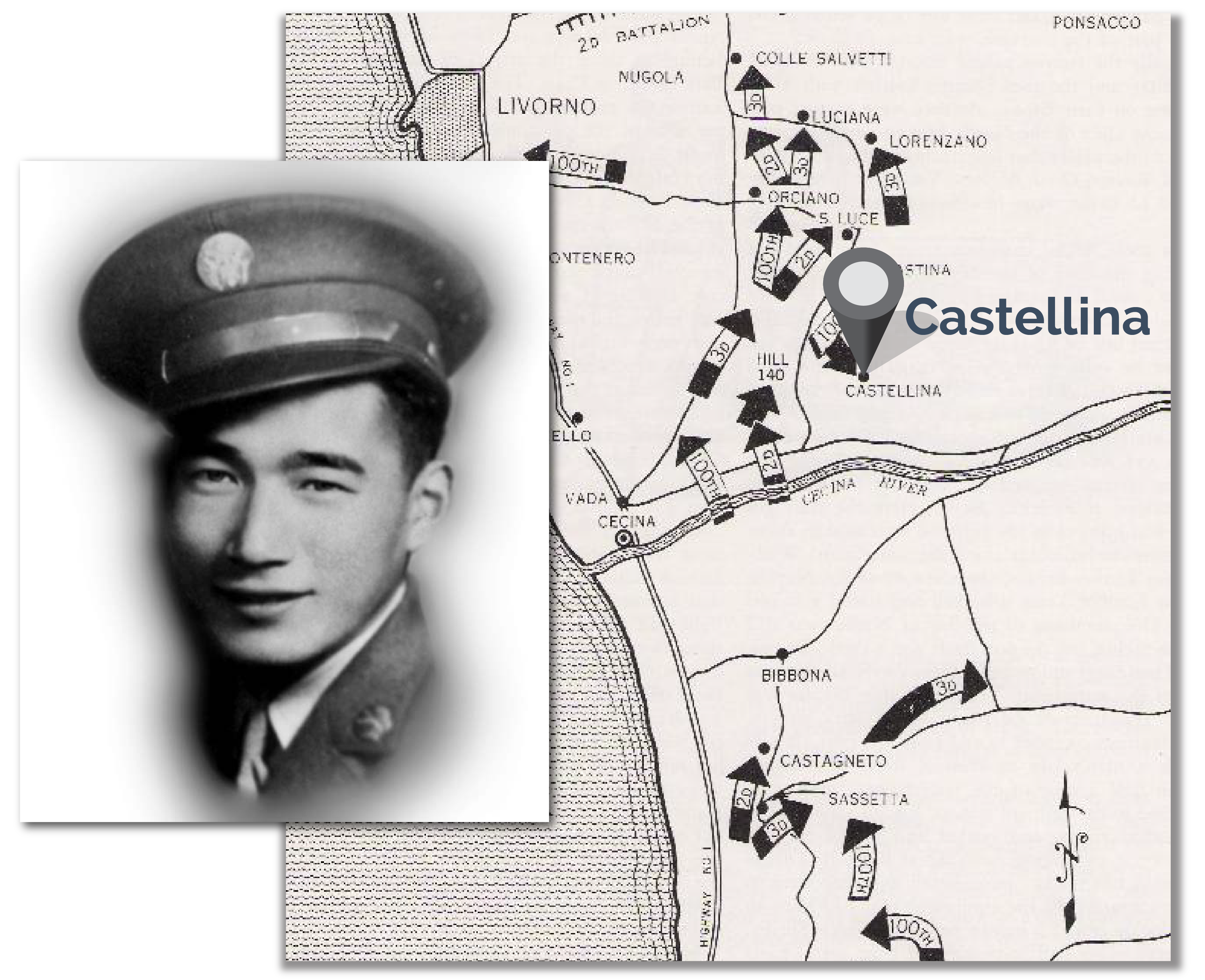
Pfc. William Nakamura
Private First Class Joe M. Nishimoto
Company G, 442nd Regimental Combat
Team
Killed in November 1944, eight days after his heroic act at
La Houssiere, France, for which he is honored
Born: Fresno,
California, February 21, 1919
Died: November 15, 1944
Enlisted while
incarcerated at Jerome, family
incarcerated at Rowher
Boldly crawled forward through a heavily mined and booby-trapped area. ... Hurled a grenade and destroyed the emplacement. ... Continuing his determined assault ... the enemy, with their key strong points taken, were forced to withdraw.
Pfc. Joe M. Nishimoto
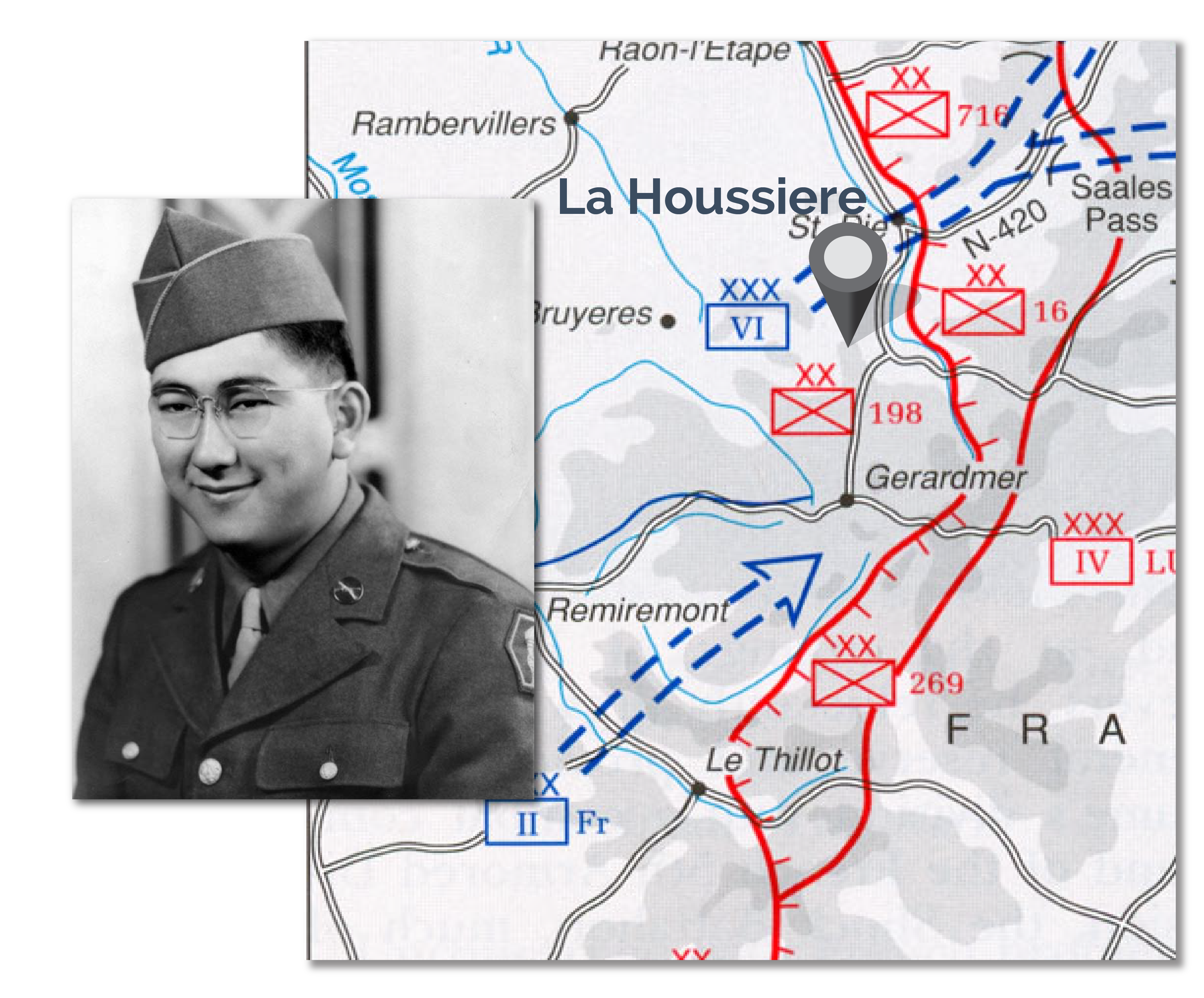
Pfc. Joe M. Nishimoto
Staff Sergeant Allan M. Ohata
Company B, 100th Infantry
Battalion (Separate)
For actions at Cerasuolo, Italy, November
29–30, 1943
Born: Honolulu, Hawaii, September 13, 1918
Died:
October 17, 1977
With utter disregard for his personal safety, advanced through heavy machine gun fire. ... He fired, killing 10 and successfully covering his comrade's withdrawal. ... Held their position and killed 37. ... Held their flank with grim determination and staved off all attacks.
Staff Sgt. Allan M. Ohata
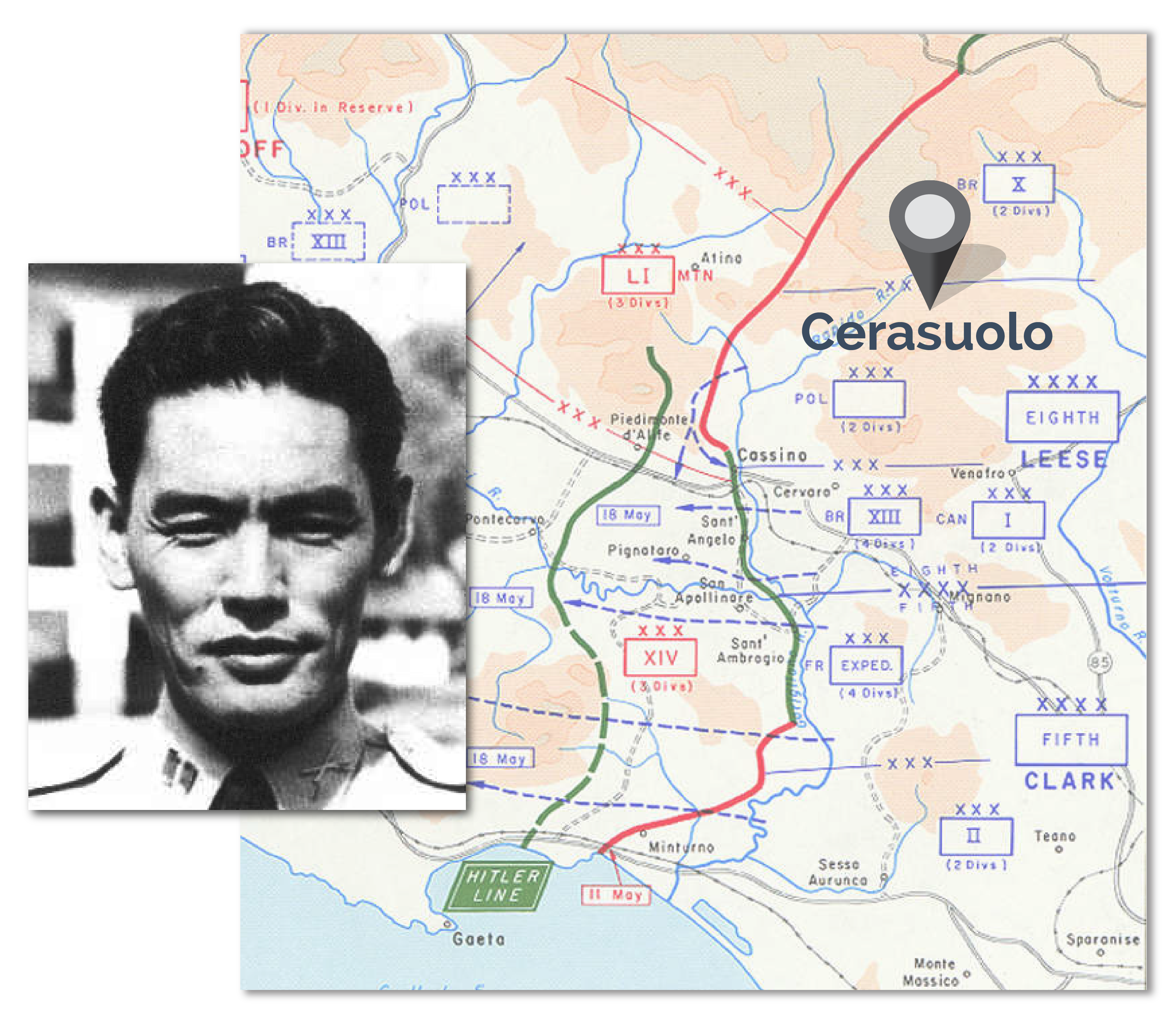
Staff Sgt. Allan M. Ohata
Technician Fifth Grade James K. Okubo
442nd
Regimental Combat Team
For actions near Biffontaine, France,
October–November, 1944
Born: Anacortes, Washington, May 30, 1920
Died: January 29, 1967
Enlisted while incarcerated at Tule Lake,
family incarcerated at Manzanar and Heart Mountain
Under strong enemy fire coming from behind mine fields and roadblocks, crawled 150 yards ... to carry back wounded comrades. ... Under constant barrages treated 17 men. ... Ran 75 yards under grazing fire and treated a seriously wounded crewman.
Technician 5th Grade James K. Okubo
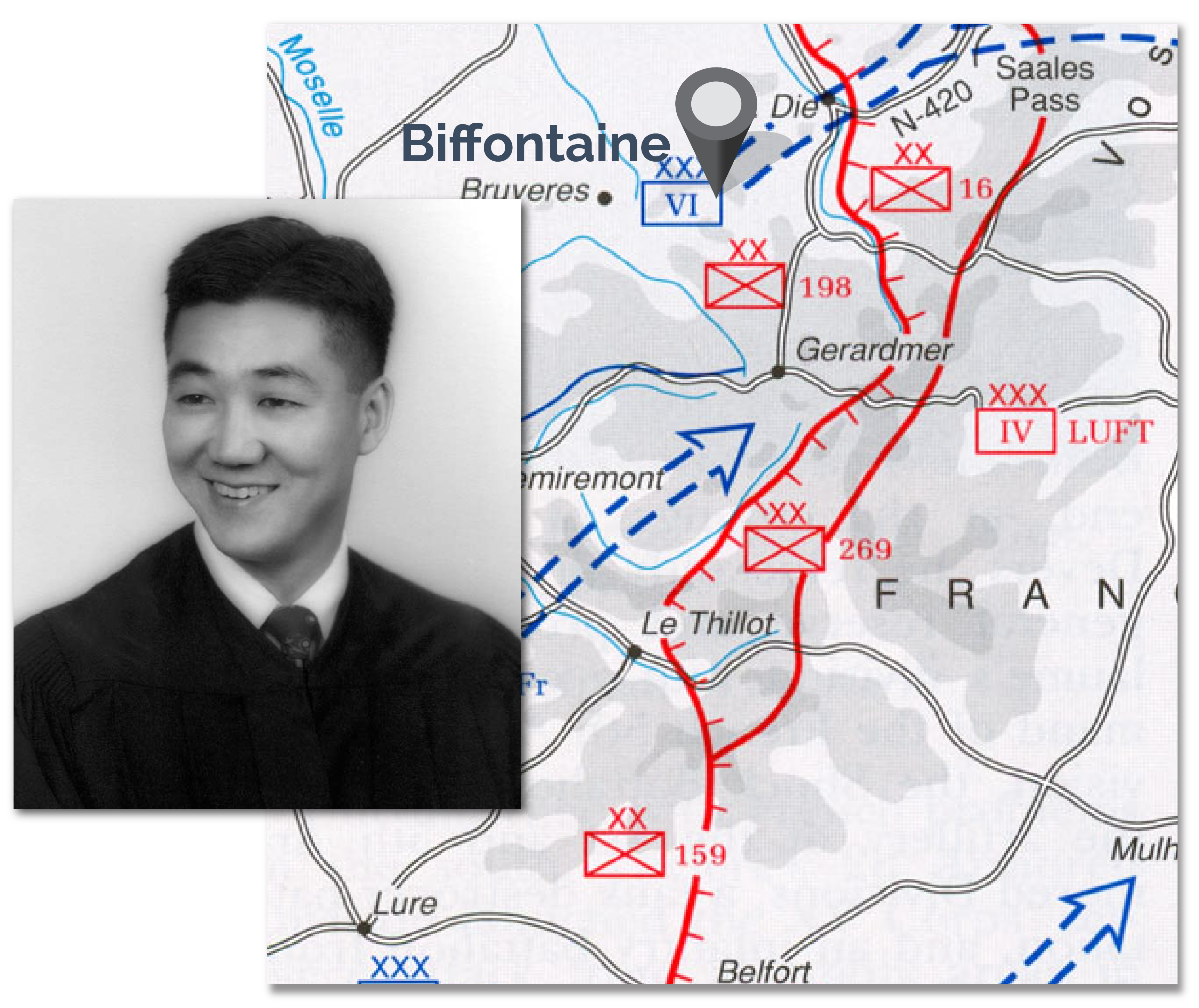
Technician 5th Grade James K. Okubo
Technical Sergeant Yukio Okutsu
Company F, 442nd Regimental Combat
Team
For actions at Mt. Belvedere, Italy, April 7, 1945
Born: Koloa, Kauai, Hawaii, November 3, 1921
Died: August 24, 2003
Crawling and dashing from cover to cover. ... Silencing a second machine gun, wounding two, and forcing two others to surrender. ... Was stunned momentarily by rifle fire, which glanced off his helmet. ... Recovering, he bravely charged several enemy riflemen. By these single-handed actions he enabled his platoon to resume its assault.
Tech. Sgt. Yukio Okutsu
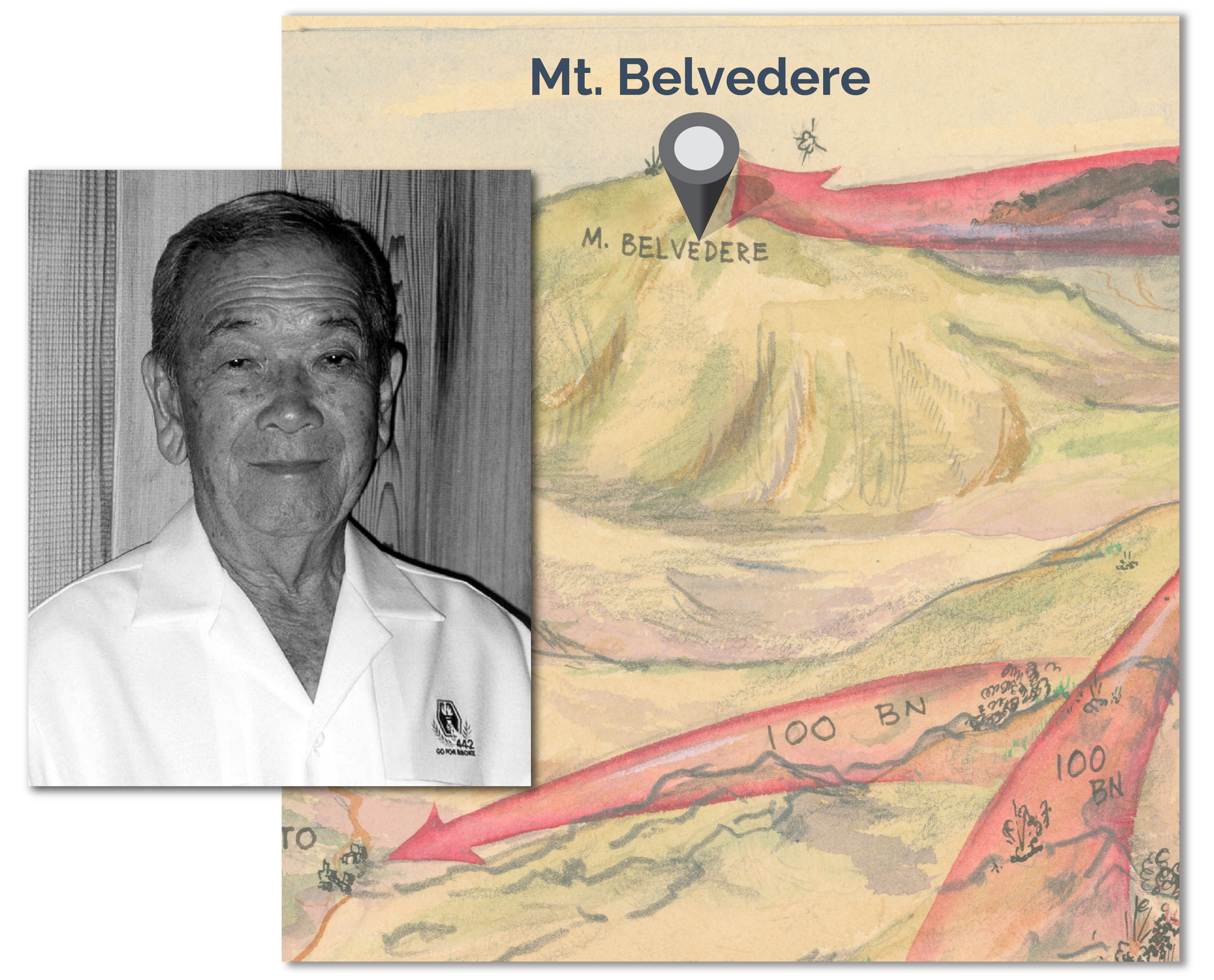
Tech. Sgt. Yukio Okutsu
Private First Class Frank H. Ono
Company G, 442nd Regimental Combat
Team
For actions near Castellina, Italy, July 4,
1944
Born: Starke County, Indiana, June 5, 1923
Died: May 6,
1980
Family incarcerated at
Heart Mountain
Alone defended the critical position. ... Boldly ran through fire to render first aid to his platoon leader and a seriously wounded rifleman. Volunteering to cover the platoon, he made himself the constant target until the platoon reached safety.
Pfc. Frank H. Ono
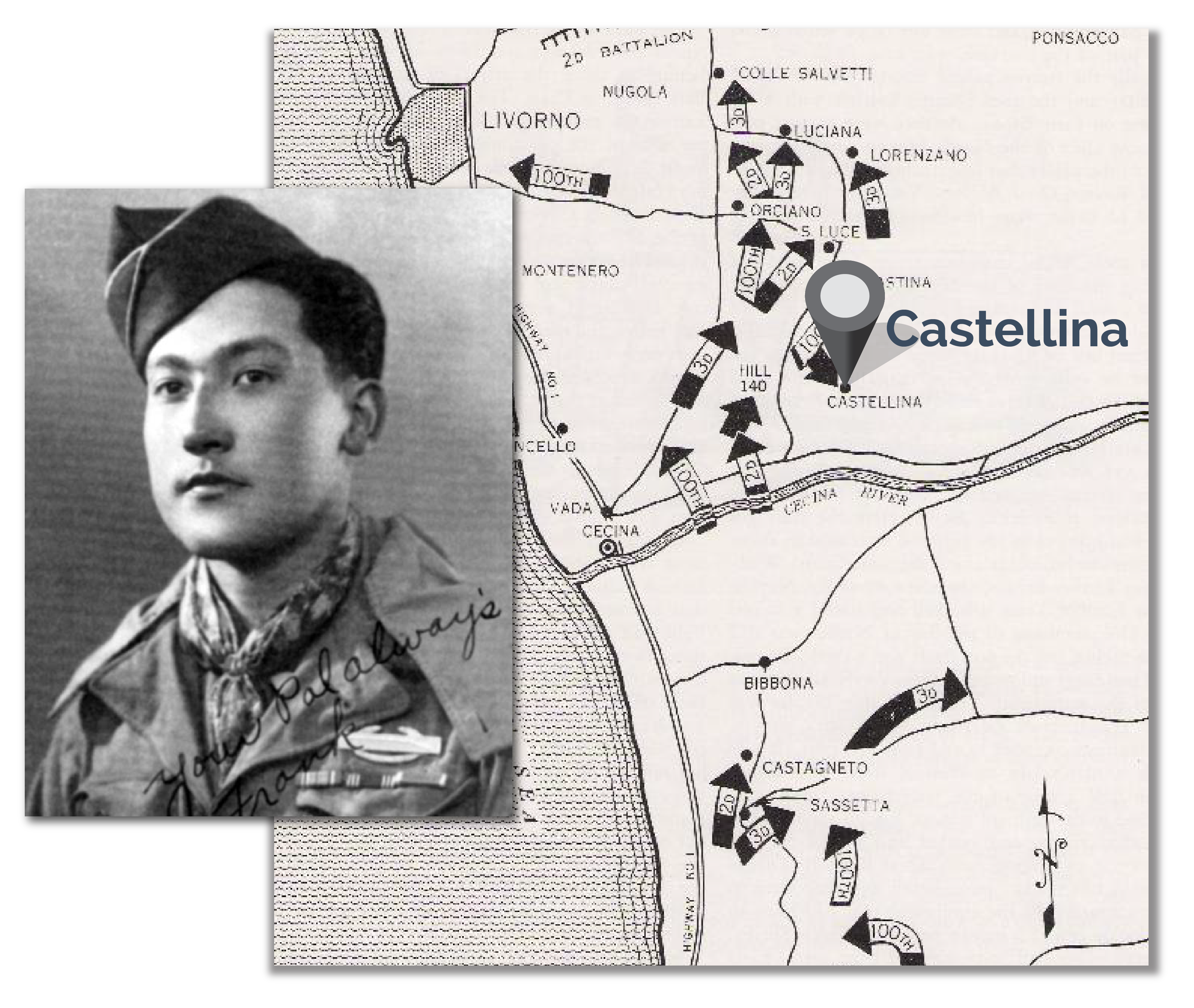
Pfc. Frank H. Ono
Staff Sergeant Kazuo Otani
Company G, 442nd Regimental Combat
Team
Killed in action near Pieve Di S. Luce, Italy, July 15,
1944
Born: Visalia, California, June 2, 1918
Died: July 15,
1944
Family incarcerated at
Gila River
Pinned down in a wheat field, left his cover and shot and killed a sniper. ... Exposing himself to fire, enabled the men to reach cover. ... Crawled to the wounded soldier ... proceeded to render first aid treatment, but was mortally wounded by machine gun fire.
Staff Sgt. Kazuo Otani
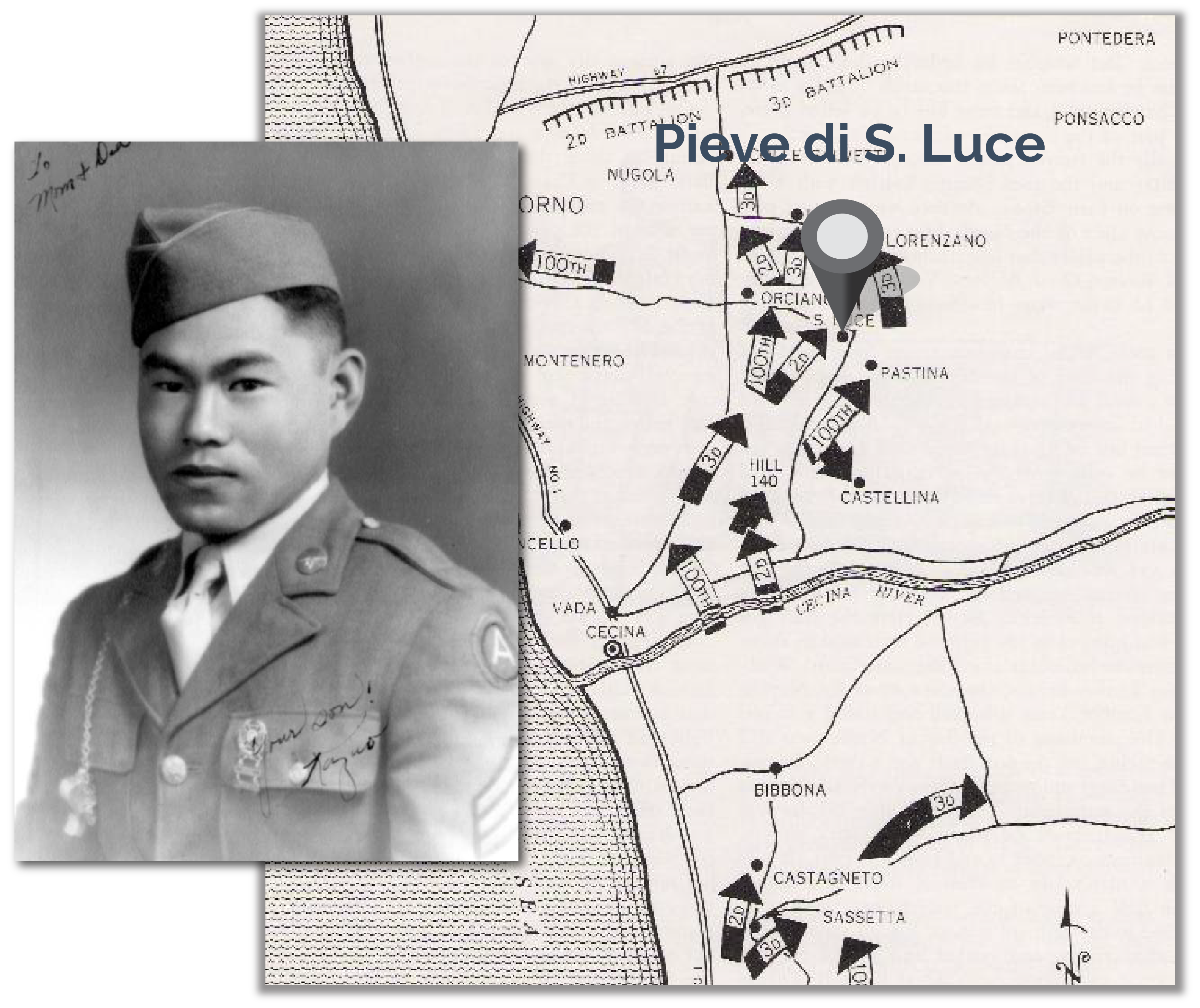
Staff Sgt. Kazuo Otani
Private George T. Sakato
Company E, 442nd Regimental Combat
Team
For actions at Biffontaine, France, October 29, 1944
Born: Colton, California, February 19, 1921
Disregarding the enemy fire ... made a one-man rush. ... Proved to be the inspiration halting a counter-attack. ... Taking charge of the squad, he killed 12 and wounded two, personally captured four. ... His gallant courage and fighting spirit turned impending defeat into victory.
Pvt. George T. Sakato
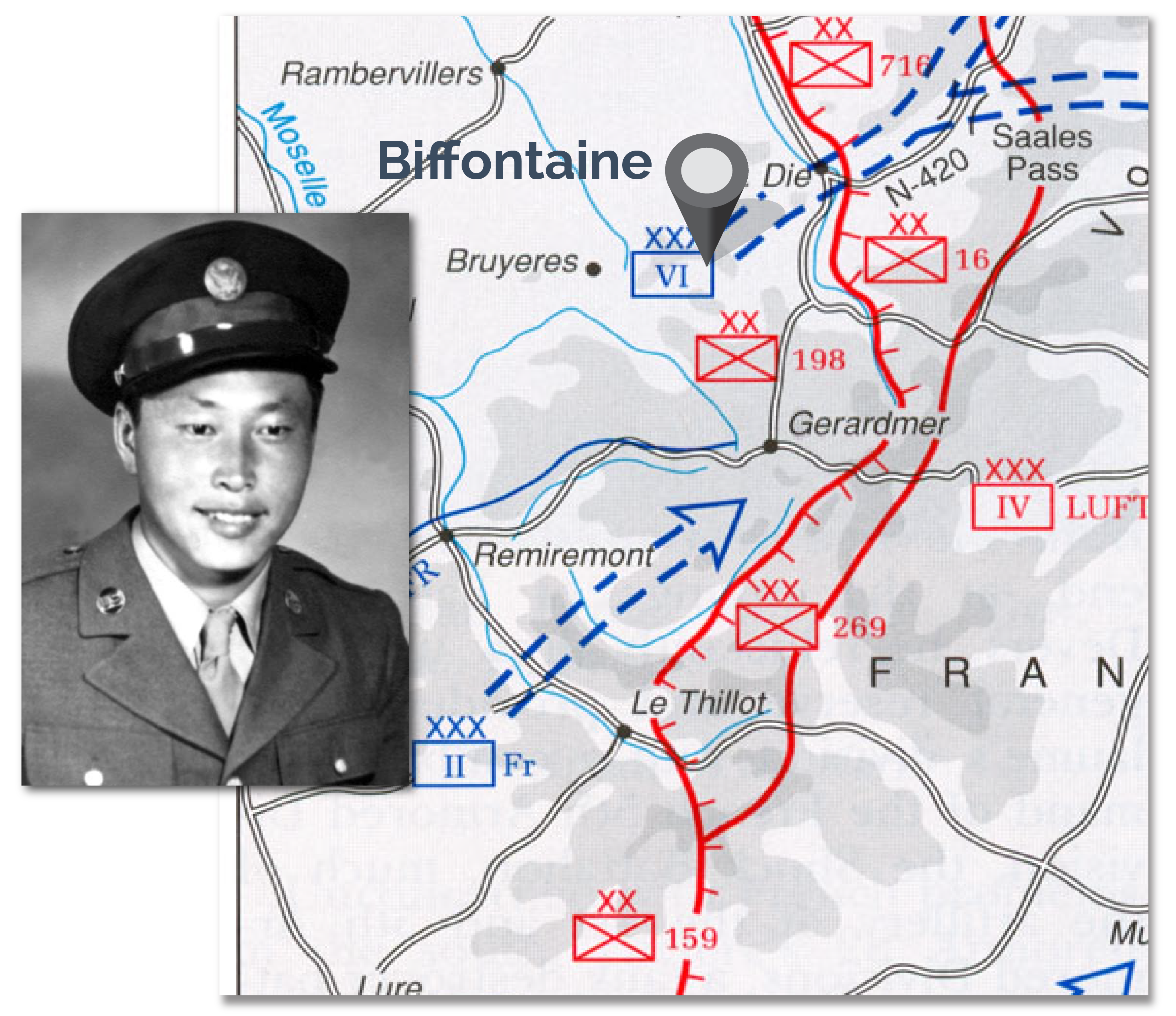
Pvt. George T. Sakato
Technical Sergeant Ted T. Tanouye
Company K, 442nd Regimental Combat
Team
For actions at Molina A. Ventoabbto, Italy, July 7,
1944
Born: Torrance, California, November 14, 1919
Died:
September 6, 1944
Family incarcerated at Jerome and
Rowher
Was subjected to grenade bursts, which severely wounded his left arm. ... Raked the position with fire and wounded several. ... Running out of ammunition, he crawled 20 yards to obtain clips. ... Finally taking his objective, organized a defensive position before accepting first aid.
Tech. Sgt. Ted T. Tanouye
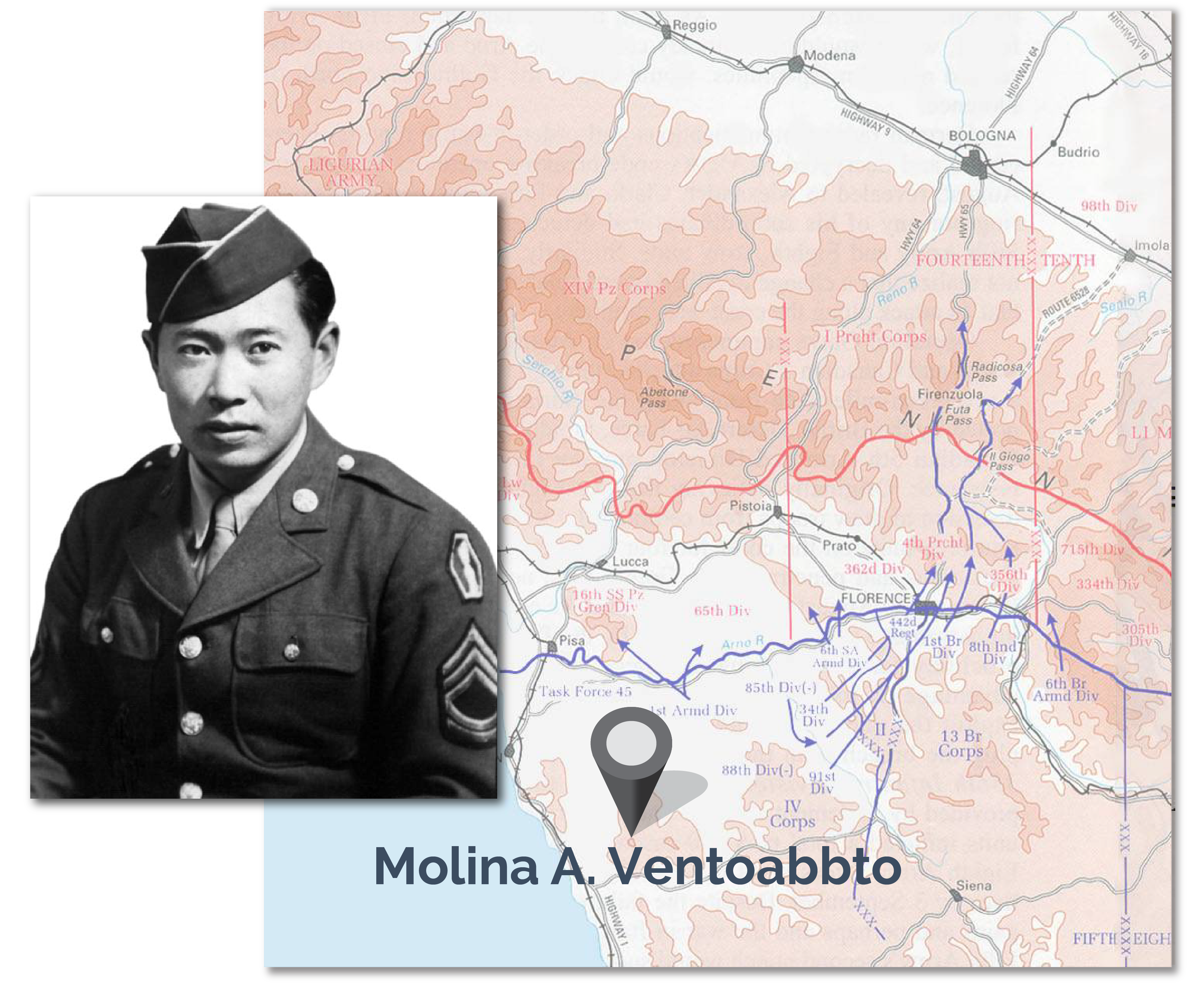
Tech. Sgt. Ted T. Tanouye
Resources
To learn more about the Medal of Honor, visit Resources.
Credits
Photographs courtesy of the US Army Center of Military History. The video was made possible by A Tradition of Honor, Go for Broke National Education Center.
